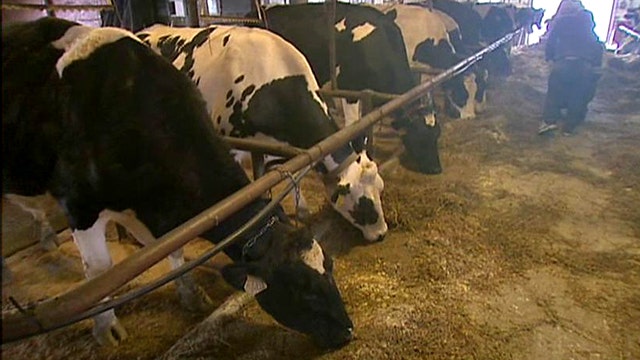Money in manure? Unusual renewable energy source
Garret Tenney reports from Fair Oaks, Indiana
The next time you drive past a farm and smell cow manure, here's something to think about while you're holding your nose. The stinky stuff could someday be an inexpensive source for fueling your car and powering your home.
The green energy concept is already in use in places around the country and has been for years, but lately the technology has gone to a whole new level.
Fair Oaks Farm, in Fair Oaks, Indiana is not only one of the largest dairy farms in the country, its also at the front end of innovation. This 30,000 acre dairy farm harnesses the power of poop from tens of thousands of cows, to run its barns, offices, cheese factory and gift shop. What takes this farm one step ahead of the others is its ability to power its 42 tractor trailers that deliver milk to nearby states with renewable gas that also comes from animal waste. "We're self sufficient and we're lowering our carbon footprint" says Gary Corbett, Fair Oaks Farm CEO.
The process of turning the waste into natural gas by using what are called anaerobic digesters, has become much more efficient. "We take the manure from the cows and put it into sealed digester vessels, the manure is heated to 100 degrees at which the bacteria produces methane and CO2, which is called biogas. The Biogas is cleaned to remove the CO2, using water and pressure to create biomethane, which is then odorized to create renewable natural gas" explains Mark Stoermann of AMP Americas, an energy company partnering with Fair Oaks Farm to create the fuel.
The cow power concept is also saving the farm millions of dollars a year. "We were running all these diesel trucks and we began to look at the potential of replacing all that diesel with natural gas. Then we figured out how to create our own natural gas instead of buying the diesel, so it saves us a lot of money, lowers emissions and helps clean up air quality in the cities where the trucks deliver" Corbett explains. “In 2013, we will take personally 2-million gallons of diesel of the road that we used in 2011 to deliver our milk.” And Corbett says, the biofuel burns cleanly so its better for the environment.
“With renewable natural gas, using organic waste like we’re doing here, there really is an unlimited supply as long as we continue to produce waste products and are able to digest them and convert them into energy.” says Stoermann.
With 36,000 cows on the farm and million gallons of manure on site, a constant source of energy is readily available. But the cows don't get all the credit. Fair Oaks is working with 3000 pigs as well. While pig waste is not as efficient for making fuel, its used as an additive to boost the power of the cow waste. So no waste goes to waste, and there's practically an unlimited supply. "As long as we keep milking cows, we'll never run out of gas" Corbett says.
“We’re working with dairy producers and other industries to start to power their fleets on natural renewable natural gas all through the United States, and AMP America’s is building out infrastructure to allow them to be able fuel all up and down the interstate highway system.” Stoermann adds.
Its a fuel source not only for the farms but for nearby towns as well. "One cow can power a home," says Erin Fitzgerald, from The Innovation Center for US Dairy. And since the excess gas can be sold back to the grid "Its a new source of revenue for dairy farmers" who have been struggling in recent years, she says.
And there are already investors looking to take this technology beyond the farm, to make it available for wider use as electricity in towns and cities.
"Turning farm waste into fuel has amazing potential" says energy technology consultant Brian Dolrein. "I can imagine a time in the near future when homes and factories will be powered by it and our cars will be running on it. It could reduce our dependence on fossil fuels and foreign oil".









































